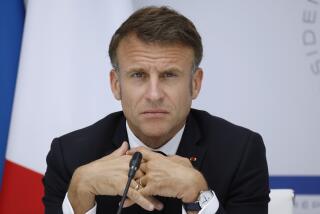As talks break down, European negotiators race to avoid a Greek tragedy
Attempts to forge an agreement over Greece’s troubled finances ended in failure Thursday, just five days before the Mediterranean country is due to make a loan repayment or risk going into default.
Finance ministers from the 19-nation Eurozone gathered in Brussels said they would meet again Saturday to try to bridge the glaring differences between Athens and its international creditors in order to stave off the threat of a bankruptcy that could force Greece to abandon the common euro currency.
“It will need still many hours. The last hours have been really critical,” European Union President Donald Tusk said, adding: “But I have a good hunch that, unlike in Sophocles’ tragedies, this Greek story will have a happy end.”
It was a rare note of optimism on a day marked by more of the acrimony — especially between Greece and Germany, the EU’s biggest economy — that has made reaching a deal difficult.
An agreement is necessary to unlock the final installment of funds from two bailouts that Athens has received from international lenders totaling about $270 billion. Without it, Greece will be unable to repay $1.8 billion it owes the International Monetary Fund by Tuesday’s deadline.
The two sides are at odds over how Greece plans to keep its budget in surplus so it can service its debt even as its economy languishes in a deep and damaging depression.
Hopes of a deal received a boost earlier this week after new proposals were put forward by Greek Prime Minister Alexis Tsipras. Elected on an anti-austerity platform, Tsipras’ left-wing administration has pledged to hold the line on protecting pensions and public-sector wages, and has proposed raising more money through higher taxes, particularly on businesses.
Tsipras has also demanded some sort of debt relief or writedown, without which most economists say Greece will find it impossible to return to growth because of the staggering amount of public debt it must pay off.
But the creditor countries and institutions sent back Tsipras’ plan replete with corrections and objections written in red ink, saying that raising tax would hamper growth and insisting on more spending cuts.
The Greek leader accused Eurozone negotiators of trying to humiliate his country, while senior German officials complained that Athens had taken a step backward.
German Chancellor Angela Merkel said Thursday that reaching an agreement was essential before the markets opened Monday and before Greek banks, operating on a lifeline from the European Central Bank, ran out of money. Worried depositors have pulled out billions of euros over the past several days in what analysts describe as, if not a full-on run, then at least a slow jog on the banks.
Jeroen Dijsselbloem, who heads the group of 19 Eurozone finance ministers, said a fresh round of counterproposals arrived from Greece too late Thursday to be properly evaluated and voted on by European Union leaders gathering for a two-day summit.
“On a number of issues there is still a wide gap with the Greek authorities,” Dijsselbloem told reporters.
Down-to-the-wire negotiations with Greece have been the norm throughout the 5½-year-old euro debt crisis, as both sides stake out maximalist positions and challenge each other to blink.
While this iteration might follow the same script, analysts warn that time is truly running short. Even if an agreement is reached among European leaders in Brussels, the deal will then be subject to approval by various national parliaments.
That includes both Germany and Greece itself, where Tsipras faces a potential revolt from backbenchers who believe he has already backtracked too much on their party’s anti-austerity pledges. In Berlin, Merkel also must face down disgruntled lawmakers who feel Greece has gotten away with too much.
Follow @HenryHChu on Twitter for coverage of Europe
More to Read
Sign up for Essential California
The most important California stories and recommendations in your inbox every morning.
You may occasionally receive promotional content from the Los Angeles Times.











